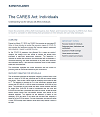Review provisions that include penalty-free distributions, loan limit changes and a waiver of 2020 RMDs.
Passed on March 27, 2020, the CARES Act provides an estimated $2 trillion in fiscal stimulus to combat the economic impact of COVID-19 and provides the healthcare industry the financial support, equipment and protection it needs to combat the virus.
Below, review some of the major provisions in the CARES Act related to retirement plans, distributions and contributions.
Penalty-free distributions
A coronavirus-related distribution of up to $100,000 can be made from IRAs, employer-sponsored retirement plans or a mix of both by an individual impacted by the coronavirus.
A coronavirus-related distribution includes one that is made to:
- An individual diagnosed with COVID-19.
- A spouse or dependent of a person diagnosed with COVID-19.
- An individual who experiences adverse financial consequences as a result of being quarantined, furloughed or laid off, or having work hours reduced due to COVID-19.
- An individual who is unable to work due to lack of childcare due to COVID-19.
- An individual who has closed or reduced hours of a business owned or operated by the individual due to COVID-19.
- Other factors as determined by the Secretary of Treasury.
While withdrawals from retirement plans will likely have a negative impact on retirement plans, such withdrawals for individuals under age 59½ will avoid the 10% federal premature distribution penalty tax. The distribution will still be taxed as ordinary income.
A taxpayer can elect to include all of the income from a coronavirus-related distribution in their 2020 income or spread the income over three years (2020, 2021 and 2022).
In addition, the affected individual has up to three years after the day of the distribution to roll over all or a portion of the amount back into the retirement account. The rollover can be made as a single or multiple repayment over that three-year period. In instances where taxes have been paid on a withdrawal, the individual should consider filing an amended tax return.
Loans from qualified plans
Employer-sponsored retirement plans such as 401(k)s and 403(b)s normally allow loans of up to 50% of the vested account balance not exceeding $50,000. The limit has been raised substantially to 100% of the vested account balance up to $100,000. This rule applies to loans taken within 180 days of enactment of the bill.
Temporary waiver of RMDs
Required minimum distributions (RMDs) for qualified account holders are waived for 2020. RMDs for inherited or beneficiary-qualified account holders are also waived for 2020. If an individual had a required beginning date (RBD) in 2019 and delayed until 2020, they can waive both of the RMDs for the year. This only applies to those who turned 70½ in 2019. For individuals who have taken their RMD for 2020, the funds can be returned. This is treated as a distribution, and 60-day indirect rollover rules apply.
Qualified charitable distributions (QCDs) can still be taken for individuals who are charitably inclined. They have to be at least age 70½. QCDs will not count toward RMDs for 2020 since they have been waived.
Charitable contribution changes
For 2020, cash charitable contributions can be deducted up to 100% of adjusted gross income (AGI). Previously, a taxpayer could only deduct up to 60% of AGI for cash contributions (increased in 2018 from 50% of AGI due to the 2017 Tax Cuts and Jobs Act). Excess charitable contributions can still be carried over five years.
The act also provides for a new above-the-line deduction for taxpayers who can’t itemize deductions on their federal tax return called qualified charitable contributions. The maximum amount is $300. Contributions must be made in cash and prohibited from being made to donor advised funds or 509(A)(3) supporting charities (the supporting organization is a charity that carries out its exempt purposes by supporting other exempt organizations, usually other public charities). The act states this starts in 2020 but does not provide any ending year.
Delay for minimum contributions to single-employer pension plans
Sponsors are able to delay 2020 required contributions to pension plans until January 1, 2021. Contributions would be due with interest accrued at the plan’s effective rate.
Single employer defined benefit pension plan minimum required contributions due during 2020 can be delayed to January 1, 2021 (adjusted for interim earnings). This provision will also provide an option to use an alternative funding target percentage.
Your financial advisor and tax professional can provide more information about how the CARES Act affects you directly.
Read the full whitepaper:
The CARES Act: Individuals
Raymond James and its advisors do not offer tax advice. You should discuss any tax matters with the appropriate professional.
Markets & Investing Members of the Raymond James Investment Strategy Committee share their views on...
Markets & Investing Review the latest Weekly Headings by CIO Larry Adam. Key Takeaways ...
Technology & Innovation Learn about a few simple things you can do to protect your personal information...
